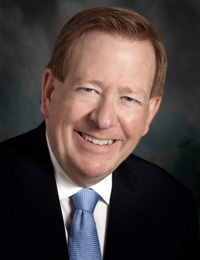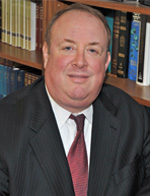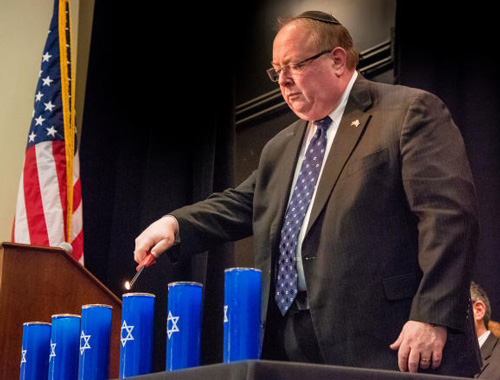For the last two decades, the City of Carmel has held a Holocaust Remembrance Ceremony to reflect on the 6 million people who were killed and to honor those who survived. This year the ceremony will take place at noon on Friday, May 3 at The Tarkington Theater, 3 Center Green, Carmel.

Brainard

Sendrow
The Reporter spoke to Carmel Mayor Jim Brainard and Rabbi Benjamin Sendrow of Congregation Shaarey Tefilla about the history and importance of this annual event.
“When I became Mayor, I realized that we had holocaust survivors living in Carmel,” Brainard told The Reporter. “We still do today, and we have many children and grandchildren of survivors living here. We need to recognize the horrible experience they went through.”
Brainard said he believes it is important to conduct these ceremonies throughout the country.
“In an enlightened, civilized society it is important that we recognize that throughout the country whether it is the Midwest, or California, or New York or Texas or Florida,” Brainard said. “We need to pay attention to what went wrong in the 1930s in Germany – a society not that unlike our own. We need to talk about not just tolerance, what happens when we don’t have tolerance. We also need to talk about what happens when we don’t accept other people and their different backgrounds.”
Brainard has worked to ensure that this community event is not just about remembrance, but about recording history to help ensure future generations never forget what can happen when prejudice supplants freedom.
“We record the survivors’ accounts and the liberators’ accounts,” Brainard said. “We have had several veterans from the U.S. Army who walked in on these camps and found these horrendous conditions – people that were starving, abused and tortured. We record their stories and put copies in the Carmel Library, we keep them in City Hall, and we send a copy to the Holocaust Museum in Washington, D.C.”

Six candles are lit in memory of the 6 million Jews whose lives were extinguished in the Holocaust. (Photo provided)
Rabbi Benjamin Sendrow has been involved in the Carmel ceremony since 2010.
“We are the only synagogue in Carmel,” Rabbi Snedrow told The Reporter. “My predecessor was the first Rabbah that worked with the Mayor, and when I came to Carmel the Mayor asked me if I would be willing to step into that role. Of course, I was honored to do so. I have been doing it every year ever since.”
Rabbi Sendrow called this one of the most moving and touching experiences of the year every year. He wanted to stress that this was not something the Jewish community asked the Mayor to do them, but rather something Brainard initiated for the benefit of everyone in the city.
“We get a wonderful turnout,” Rabbi Sendrow said. “We used to meet in the council chamber. That is not a small room, but we outgrew it and now we are in one of the theaters of the palladium complex. The attendance is fabulous. It’s not only Jewish people, but there are people from the entire community. And I’ll have people come up to me and say, ‘Are you the Rabbi who I saw at the Carmel Holocaust service?’ They will say how important they think it is or how moving the ceremony is. It’s just an honor. I take no credit for it, but it is an honor to be part of it.”
Rabbi Sendrow told The Reporter the he sees this ceremony as an important part of staying vigilant in defense of democracy.
“We like to say, ‘Never again,’ but the fact is this sort of thing still goes on,” Rabbi Sendrow said. “We cannot afford to drop our guard as a society. The Mayor has a line that he will sometimes say in his speech and it just gives me chills every time he says it. ‘During the Holocaust, democracy failed.’ Not that I think it can happen here, but democracy can fail. Any system can fail.”
The only synagogue in Carmel has open since 2007 and currently serves approximately 175 households. Rabbi Sendrow said he is very pleased with the support of the community both in the best and worst of times.
“Unfortunately, we were vandalized in late July with swastikas and iron crosses,” Rabbi Sendrow said. “We held a solidarity event. When you open the movable wall between our sanctuary and our social hall, we can easily get 500 to 600 people in there. I think 1,000 squeezed in. There were more outside and eventually the police had to start turning people away because not only was our parking lot full, but the streets all around the synagogue were full. It was absolutely gratifying it turned what was intended to be an intimidating act that was supposed to inspire hate instead inspired this amazing outpouring of support and love. It is just heartwarming to be part of such a wonderful community.”
The City of Carmel’s 2019 Holocaust Remembrance Ceremony to commemorate the Holocaust is scheduled for noon on Friday, May 3. The ceremony will last approximately an hour and a half and will be followed by a light lunch. The event is free and open to the public at The Tarkington Theater, 3 Center Green, Carmel.
Rabbi Sendrow asked that we tell our readers how appreciative the Jewish Community is for “the sensitivity of our Mayor to have initiated this event and to make sure that it happens every year. It happens in a first-class way every time,” Rabbi Sendrow said.
Bringing people together in unexpected ways
Carmel’s Holocaust Remembrance Ceremony has had a variety of speakers whose lives were affected by these terrible events of World War II. Some have been survivors and their families. Others have been the American veterans who helped liberate the German concentrations camps.
According to Carmel Mayor Jim Brainard, within the first several years of the ceremony, one of the speakers was a U.S. Army veteran from New Harmony, Ind.
While serving in WWII at the age of 19, he helped liberate one of the smaller camps holding approximately 80 starving prisoners.
“They didn’t have their rations for the evening with them yet,” Brainard said “They were waiting for the supply trucks to catch up with them.”
The soldiers had limited resources, but they pooled their food and passed it out to the prisoners. Some were so weak from starvation that they were unable to digest anything other than broth or a bit of processed cheese.
As this former soldier told his story, he told the audience the name of the camp. Brainard said there was a young man sitting in the second row whom he did not recognize, but who seemed to have a reaction to the soldier’s story.
“I went up to him afterwards and introduced myself,” Brainard said. “He was from New York and had just started his residency at IU medical school. He told me his dad had been in one of the camps. Then he said, ‘I think that this story was about the camp my dad was in.’ I asked, ‘Do you think you could find out?’”
The young man said his father was alive and healthy, living in New York, and that he’d call home that night.
At the ceremony the following year the veteran, the young doctor and his father were all present. The veteran had some photographs from the camps, taken when his unit was helping care for the prisoners in the weeks following their liberation.
In those photos and in stories from different sides of the same tragic time, was proof that these two men had met during a time war and were given a chance to come together in a time of peace in Carmel.
“The veteran from Indiana showed the doctor from New York all our state,” Brainard said. “They got to be friends and to spend a week traveling across Indiana together.”
